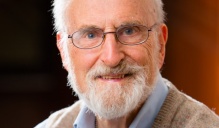Graduate Awards
Paul D. Senese Graduate Student Award
The youngest of four siblings, Paul was born and raised in Niagara Falls, New York. Paul was the pride and joy of our family. He was smart, mild-mannered, handsome, witty and hard working.
We have been told that Paul was a popular teacher, and a much-admired mentor to many graduate students. It goes without saying that we have always been incredibly impressed with his academic accomplishments; Paul earned a bachelor’s degree from Niagara University and a doctorate in political science from Binghamton University. Although Paul began his teaching career outside of Western New York, we were thrilled that he found his way back to Buffalo to join the University at Buffalo faculty in 1998 as an assistant professor. Paul was later promoted to associate professor with tenure at UB in 2005. More than anything, Paul loved research, and spent countless hours doing so to obtain his degrees, publish many articles, and co-author The Steps to War: An Empirical Study. Paul continued to work on this book throughout his illness, and he passed away a few days before the completion of the draft submitted to Princeton University Press. Co-author, dear friend and colleague, Dr. John A. Vasquez, wrote the preface of the book the morning after Paul’s funeral.
When Paul was with family and friends, he was unassuming, laid back and amazing company. In particular, he was at ease hanging out with young adults, and we recall many evenings that he spent with his nephews and their friends. We also know that he inspired them.
Conversations at family gatherings were often thought provoking, whether they were about sports (his favorite teams were the Boston Red Sox and the Boston Bruins), politics, travel, or thoroughbred horse racing, which was one of his favorite pastimes.
In wake of Paul’s devastating diagnosis, and the many doctor visits and hospitalizations that he endured, Paul remained positive and hopeful. He rarely spoke about his illness, but instead he simply said, "think happy thoughts", and he continued to express care and concern for our wellbeing. Even as I, Sandra, his eldest sibling, compile this narrative twelve years after his passing, the loss is still raw. There is not a day that goes by when he is not in my thoughts.
Our family is so very grateful and happy for the opportunity to keep Paul’s legacy alive by establishing this award, with the support of the Department of Political Science. We encourage you to find the Paul D. Senese Graduate Assistantship plaque, established in 2007, that hangs in Park Hall, and also the tree just outside of Park Hall that is dedicated to Paul. These are also reminders of a very special man.
On behalf of Paul’s family, we hope that our dear Paul’s good vibes shine down on you as you pursue your dreams, and we wish you good health and good fortune always.
In 2018, in memory of Paul, the Senese family endowed the department of Political Science with an ongoing award to recognize the best performing students in our Ph.D. program who also exhibit a dedication to teaching as well as scholarship. Preference is given to recognizing students who also share Paul Senese’s research interests in international relations.
This year's deserving recipient is Min Cho. The award ceremony is scheduled for 4/30/25.
Past winners:
2018 Sara Norrevik
2019 Chhandosi Roy
2020 Christopher Newton
2021 HanPing Derrick Ong
2022 Ahmed Alshammari
2023 Kristin Cruz
2024 Min Cho
See the 2021 award ceremony(held 3/11/21 via Zoom):https://youtu.be/muypRh4jqjo
Claude E. Welch Best Graduate Paper Award
Claude Welch’s concern for human rights started in his early teens. When he worked as a grocery stock boy, a co-worker was fired on the spot without any warning. Welch protested – and was immediately fired as well. “Justice” cannot be arbitrarily applied by those in power without constraints. Human rights thus became a key interest for him, lasting over 60 years.
Welch didn’t necessarily see academia as a career choice. While an undergraduate, he seriously considered a career in the Foreign Service. Where would the State Department most likely need personnel? This accounted in large measure for Welch’s interest in Africa, starting in the late 1950s.
The end of colonialism enhanced this interest: Africa was then relatively unknown to Americans. Welch became an early chronicler of human rights in that continent. His undergraduate thesis focused on self-determination for Namibia, then under South Africa’s apartheid domination. His PhD dissertation (published as Dream of Unity) concentrated on efforts to overcome divisions among newly-born Francophone and Anglophone states. Welch’s other major publications on Africa included Soldier and State in Africa, No Farewell to Arms?, Human Rights and Development in Africa and his magnum opus Protecting Human Rights in Africa. He edited or co-edited ten other books.
Welch received the first-ever joint TIAA-CREF and SUNY-wide Lifetime Achievement in 2006. The American Political Science Association and the International Studies Association gave him lifetime achievement awards, in 2014 and 2015.
Welch became involved in campus administration shortly after arriving at UB. Named as the ‘Boy Dean’ before he turned 28, he headed the Division of Undergraduate Education in the turbulent late 1960s. Welch became Associate Vice President for Academic Affairs in the late 1970s. He took great pride in faculty governance, serving as Faculty Senate Chair twice, and heading eight major Senate committees.During this entire period, he remained active in the classroom, receiving teaching awards from SUNY, the Student Association (three times) and Political Science undergraduates (three times).
Despite this multitude of activities, Welch was a devoted husband of Nancy Welch (who died in 1979) and of Jeannette Ludwig (a fellow UB faculty member who died in 2018). He loves spending time with his four children and seven grandchildren. Welch’s recreation includes bicycling, reading and travel.
The Claude E. Welch Best Graduate Paper Award was established in 2005 to annually recognize and reward graduate students who submitted the best paper based on original research or who made a significant contribution to understanding political phenomena.
The 2023-2024 award was given to Levantino Piccini
Previous winners:
2004-2005 Elizabeth French
2005-2006 Rafael Davtian
2006-2007 Brian Nottingham
2007-2008 Nick Seabrook
2008-2009 Annika Hagley
2009-2010 Bryan Dettrey
2010-2011 Daniel Kotlewski
2011-2012 Nick Nicoletti
2012-2013 Jackie Sievert
2013-2014 Kelly McCaskey
2014-2015 Muhammed Erenler/Yohan Park
2015-2016 Sara Norrevik
2016-2017 Sara Norrevik
2017-2018 Colin Tucker
2018-2019 Derrick Ong
2019-2020 Andrew Brown
2020-2021 Nathaniel Lambert
2021-2022 Kristin Cruz
2022-2023 Jason Arenos
2023-2024 Levantino Piccini



